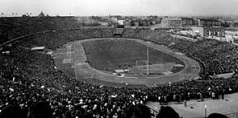|
|
 flg.jpg) "DISASTER
ON THE DANUBE"
Daily Mirror "DISASTER
ON THE DANUBE"
Daily Mirror |
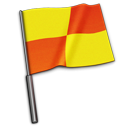  Officials Officials |
Hungary |
FIFAB ruling on substitutes |
England
Party |
Referee
(black blazer)
Giorgio Francesco Valentino
Bernardi
36 (16 May 1912), Bologna, Italy |
Only an injured goalkeeper may be substituted. This is a compromise between the IFAB rule and the FIFA ruling on allowing substitutes. |
|
Linesmen |
|
tbc |
tbc |
|
|
"HUNGARIAN SEASON
HALTED FOR ENGLAND GAME.
"All league and championship football will be
halted temporarily in Hungary from May 9th to give the Hungarian players,
who meet England in Budapest on May 23rd, a spell of uninterrupted
training. This was announced yesterday by the Hungarian Deputy Minister of
Sports, Gustav Sebes, according to Budapest Radio." -
Thursday, 22 April 1954, The Lancashire Evening Post.
|
 Hungary
Team Hungary
Team |
| |
|
Rank |
No official ranking system established;
ELO rating 1st |
Colours |
Cherry red v-necked short-sleeved jerseys, white shorts, green socks |
|
Captain |
Ferenc
Puskás |
Manager |
Selection Committee headed by Gusztáv Sebes
Team chosen on Thursday, 20 May 1954. |
|
Trainer: Gyula Mándi |
 Hungary
Lineup Hungary
Lineup |
|
1 |
Grosics, Gyula, off 77th min. |
28
108 days |
4 February 1926 |
G |
Budapest Honvéd SE |
31 |
22ᵍᵃ |
|
2 |
Buzánszky, Jenő |
29
19 days |
4 May 1925 |
RB |
Dorogi FC |
23 |
0 |
|
4 |
Lóránt, Gyula |
31
106 days |
6 February 1923 |
RCB |
Budapest Honvéd SE |
24 |
0 |
|
6 |
Zakariás, József |
30
59 days |
25 March 1924 |
LCB |
Vörös Lobogó SE |
31 |
0 |
3
 |
Lantos, Mihály |
25
236 days |
29 September 1928 |
LB |
Vörös Lobogó SE |
30 |
2 |
|
5 |
Bozsik MP, József |
28
176 days |
28 November 1925 |
DM |
Budapest Honvéd SE |
48 |
4 |
9
  |
Hidegkuti, Nándor |
32
81 days |
3 March 1922 |
AM |
Vörös Lobogó SE |
36 |
26 |
7
 |
Tóth, József |
25
7 days |
16 May 1929 |
OR |
Budapesti Dózsa SE |
2 |
1 |
8
  |
Kocsis, Sándor P. |
24
244 days |
21 September 1929 |
IR/F |
Budapest Honvéd SE |
36 |
37 |
10
  |
Puskás,
Ferenc |
27
52 days |
1 April 1927 |
IL/F |
Budapest Honvéd SE |
55 |
65 |
|
most apps & goals |
11
 |
Czibor, Zoltán |
24
273 days |
23 August 1929 |
OL |
Budapest Honvéd SE |
22 |
6 |
 Hungary Substitute Hungary Substitute |
|
scoreline:
Hungary 7
England 1 |
|
1 |
Gellér, Sándor, on 77th min. for Grosics |
28
315 days |
12 July 1925
in Veseuş, Romania |
G |
Vörös Lobogó SE |
5 |
1ᵍᵃ |
|
result:
Hungary 7
England 1 |
|
unused
substitutes: |
not known |
|
team notes: |
Despite agreeing only
to substitute an injured goalkeeper, Grosics' substitution appeared to
defy this ruling. Both goalkeepers wore black jerseys with the number
one on their backs. |
|
substitute notes: |
"After 77 minutes the Hungarians took
advantage of their agreement with
the England officials to change their goalkeeper, but it was generally
understood by the British Press that this was to only operate in the
event of the goalkeeper being injured. Grosics appeared to have
nothing wrong with him when he retired and the reserve goalkeeper,
Geller, took his place." |
|
records: |
Lantos' opening free-kick goal was only the fourth time England have
conceded a direct free-kick, the first time England have conceded a
direct free-kick for over twenty-two years. |
|
The Hungarians were set up at their headquarters on Margaret Island,
in the Danube, near Budapest. |
|
|
|
4-(1-1)2-4 |
Grosics (Gellér)
-
Buzánszky, Lóránt, Zakariás,
Lantos -
Bozsik -
Hidegkuti -
Tóth, Kocsis, Puskás,
Czibor. |
Averages:
(start)
(finish) |
Age |
27 years 325 days
27 years
343 days |
Appearances/Goals |
30.7 |
12.2 |
|
most experienced opposing side
so far |
|
|
|
flg.jpg) England
Team England
Team |
| |
|
Rank |
No official ranking system established;
ELO rating 4th |
Colours |
The 1949 home
uniform -
White collared short-sleeved jerseys, blue shorts, black socks
with white tops.
|
|
P 39th of 43, W 21 - D 9 - L 9 - F 102 - A 66. |
|
Captain |
Billy Wright |
Manager |
Walter Winterbottom, 41 (31 March 1913), appointed as FA national director of coaching/team manager on 8 July 1946; |
|
record 43rd of 90, W 25 - D 8 - L 10 - F 105 - A 66. |
Trainer: Jimmy Trotter (Charlton Athletic FC) |
P 61st of 139, W 38 - D 12 - L 11 - F 179 - A 87,
one abandoned |
|
|
 ³ ³ |
Team chosen by the Selection Committee, headed by Harold Shentall,
on Friday, 21 May. |
flg.jpg) England
Lineup England
Lineup |
|
|
three
changes to the previous match (Harris, Sewell & Jezzard>Allen, Nicholls, Mullen) |
FINAL league positions
(FL1 26 April, FL2 29 April) |
|
|
Merrick, Gilbert H. |
32
117 days |
26 January 1922 |
G |
Birmingham City FC
(FL2 7th) |
20 |
37ᵍᵃ |
|
the 26th player to reach the 20-app milestone |
first to 37ᵍᵃ |
|
2 |
Staniforth, Ronald |
30
40 days |
13 April 1924 |
RB |
Huddersfield Town AFC
(FL 3rd) |
3 |
0 |
|
3 |
Byrne, Roger W. |
24
257 days |
8 September 1929 |
LB |
Manchester United FC
(FL 4th) |
3 |
0 |
|
4 |
Wright, William A. |
30
106 days |
6 February 1924 |
RHB |
Wolverhampton
Wanderers FC (FL
CHAMPIONS) |
58 |
3 |
|
most apps
1952-54 |
|
5 |
Owen, Sydney W. |
31
236 days |
29 September 1922 |
CHB |
Luton Town FC
(FL2 6th) |
2 |
0 |
|
6 |
Dickinson, James
W. |
29
29 days |
24 April 1925 |
LHB |
Portsmouth
FC (FL 14th) |
35 |
0 |
|
7 |
Harris, Peter P. |
28
155 days |
19 December 1925 |
OR |
Portsmouth FC
(FL 14th) |
2 |
0 |
|
final app
1954 |
|
8 |
Sewell, John |
27
119 days |
24 January 1927 |
IR |
Sheffield Wednesday FC
(FL 19th) |
6 |
3 |
|
final app
1954 |
|
732 |
9 |
Jezzard, Bedford A.G. |
26
216 days |
19 October 1927 |
CF |
Fulham FC
(FL2 8th) |
1 |
0 |
|
the sixth Fulham player to represent
England |
10
 |
Broadis, Ivan A. |
31
156 days |
18 December 1922 |
IL |
Newcastle United FC
(FL 15th) |
11 |
6 |
|
11 |
Finney,
Thomas |
32
48 days |
5 April 1922 |
OL |
Preston
North End FC (FL 11th) |
51 |
23 |
|
unused substitutes: |
Ted Burgin (Sheffield United FC (FL 20th)),
Jackie Mansell (Portsmouth FC
(FL 14th)),
Ken Armstrong (Chelsea FC (FL 8th)),
John Haynes (Fulham FC (FL2 8th)),
Jimmy Mullen (Wolverhampton Wanderers FC
(FL CHAMPIONS)). |
|
records: |
The result marks a new low in England's records, this being their new
heaviest defeat. They had not conceded seven goals since 1878.
Third time, post-war, they have suffered two back-to-back defeats.
Not since 1878 have England suffered three friendly defeats in a row.
This is just the
fifth time England have lost three matches in a single season.
For
the first time, England have conceded 22 goals in a single season.
This is England's third Sunday defeat in a row, having lost in
Uruguay
last season, and
in Yugoslavia, last week. |
|
|
|
2-3-5 |
Merrick -
Staniforth, Byrne -
Wright, Owen, Dickinson -
Harris, Sewell, Jezzard, Broadis, Finney. |
|
Averages: |
Age |
29 years 170 days |
Appearances/Goals |
17.5 |
3.1 |
|
|
|
|
Match Report by
Mike Payne |
|
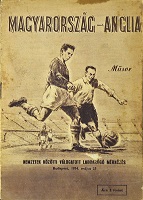 Six
months earlier at Wembley, England were given a football lesson by the
magnificent Hungarian side. It was the first time they had been beaten on
home soil by a continental team and it was hoped that many lessons would
be learned from the experience. Sadly, on this performance against that
same Hungarian side, few would believe that they have learned any. Six
months earlier at Wembley, England were given a football lesson by the
magnificent Hungarian side. It was the first time they had been beaten on
home soil by a continental team and it was hoped that many lessons would
be learned from the experience. Sadly, on this performance against that
same Hungarian side, few would believe that they have learned any.
England were
once again totally outclassed. Hungary simply tore them apart with some
devastating football and scored virtually at will. The old fashioned
tactics that England employed were shown up to be woefully inadequate by
the slick pattern of the Hungarian formation. Quick, accurate short
passing was coupled with lethal long passes which totally bemused
overworked defenders. One of the most obvious differences between the two
sides was in the teamwork. Whereas England played as a group of
individuals doing their own jobs the Hungarians moved as one unit with Puskás,
especially, pulling the strings.
The trouble began
in the tenth minute when Jimmy Dickinson was somewhat harshly penalised
for a foul on Hidegkuti 20 yards from goal. Puskás summoned up the
powerful Lantos from the back to take the free-kick and before you could
say 'Hidegkuti' the ball crashed into the England net. It was the
beginning of the end for the visitors and 12 minutes later they went 2-0
down when Puskás lashed home a rebound from close range after Ron
Staniforth had blocked a sharp cross by Kocsis.
The lean and
skilful inside-right Kocsis was having a fine game and on the half-hour he
scored a brilliant goal volleying home a pass from Puskás. Kocsis
had just come back on to the field after having running repairs to an
injury. How England had wished he had stayed off!
For the remainder
of the half Hungary turned on the full exhibition of their skills and it
was a bemused and bedraggled bunch of England players that trooped off at
half-time 3-0 down. Only a good shot by Ivor Broadis which brought the
best out of Grosics had given them any encouragement.
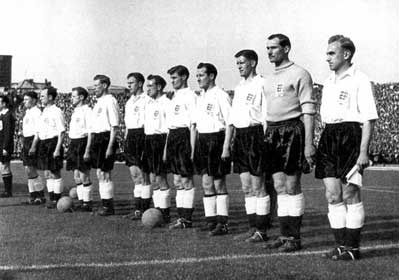 At the start
of the second half England made a brief spirited reply when Peter Harris
saw a shot blocked on the Hungarian goal-line but alas it was only a token
gesture as within 20 minutes of the restart Hungary had conjured up some
more magic to score three more goals. Kocsis, Toth and the incomparable
Hidegkuti all added to the goal tally with splendid strikes rounding off
marvellous passing movements. Gil Merrick hardly knew what had hit him and
he had little chance. At the start
of the second half England made a brief spirited reply when Peter Harris
saw a shot blocked on the Hungarian goal-line but alas it was only a token
gesture as within 20 minutes of the restart Hungary had conjured up some
more magic to score three more goals. Kocsis, Toth and the incomparable
Hidegkuti all added to the goal tally with splendid strikes rounding off
marvellous passing movements. Gil Merrick hardly knew what had hit him and
he had little chance.
The 92,000 crowd loved every minute of this
superb performance and watched in delight as each of the goals were
created following some super play.
England battled gamely on. Billy
Wright, Dickinson and Staniforth all worked themselves into the ground but
Roger Byrne was their best player with a cultured display despite all that
went on around him. Jackie Sewell and Tom Finney also worked hard although
Finney in fact missed a sitter in one attack. In the end, though, the
England players were willing the referee to end their misery. Before the
final whistle though they did manage to salvage some pride when Broadis
met a Dickinson free-kick to pull a goal back. Hungary were not amused by
this and immediately struck again with goal number seven.
This
time, appropriately perhaps, it was Puskás who advanced on to a
defence splitting pass by Hidegkuti to fire home the last humiliating nail
into the England coffin. In the remaining minutes Hungary totally
dominated and even a substitution of Grosics in goal had little effect on
an England display which is best forgotten. Unfortunately, the fact that
this ranks as England's biggest-ever defeat will probably mean that it
will never be forgotten.
|
|
Match Report by
Norman Giller |
|
This was the biggest defeat in England's
90-year football history (and continues to be so to this day). Just four
of the England team had survived from the 6-3 slaughter at Wembley in
November: Merrick, Wright, Dickinson and Finney. Fulham centre-forward
Bedford Jezzard made a best-forgotten debut, while the unfortunate Peter
Harris was winning his second and last cap after a gap of five years. His
first cap came in the 2-0 home defeat by the Republic of Ireland in 1949.
Puskas and Kocsis scored two goals each. The Hungarians, leading 3-0 at
half-time, were six goals clear and cantering before Ivor Broadis opened
the scoring for England. Hungary immediately replied with their seventh
goal, scored by Puskas from a pass by Hidegkuti. Hungary's scorers were
Puskas (2), Kocsis (2), Lantos, Toth and Hidegkuti. Billy Wright came off
with his face as white as his shirt, and looking like a man who had seen a
ghost come back to haunt him. As hard as this giant-hearted man tried, he
could not get near to suppressing the irrepressible Puskas.
|
|
Match Report
as appears in the F.A. Yearbook 1954-55, pages 29-30 |
|
Several
changes were made before the return match in Budapest, Harris and Jezzard
being incorporated into the forward line for the first time. The only
change in the Hungarian's Wembley team was that Toth replaced Budai on the
right wing. Assessment of a teams ability is always a relative matter and
it is not making excuses to say that England might have made a better
showing in different company; as it was, they were dwarfed at the side of
a team staffed by at least five geniuses and in which the rest were all
first class. The Hungarian prowess was if anything greater than that shown
at Wembley; they played football of a supreme order.
The first goal
which came in the 10th minute, seemed to discourage England from the
start: Dickinson was penalised 4 yards outside the area, yet Lantos's
free-kick somehow passed through the line-up and beat Merrick. The
Hungarians then went after the ball with incredible zest: goals came from
Puskas and Kocsis to make the score 3-0 at the interval.
After the
change of ends England at first rallied, but then came another spell of
Hungarian exuberance: between the 12th and 17th minute Merrick was beaten
by shots from Kocsis, Toth, and Hidegkuti, the entire forward line
participating in the movements that led to the goals. England's only goal
came from Broadis following a free-kick taken by Dickinson, but this was
very soon matched by a further goal by Puskas. And so to the sounds of
ra-ra-hajra - the Hungarian equivalent of hip-hip-hurrah - the match
ended with the score at 7-1.
|
In
Other News....
|
It was on 22 May 1954 that Billy Graham, a Baptist minister
from North Carolina, ended his twelve-week London Crusade by
preaching at both the White City Stadium, in front of 65,000
spectators, and at Wembley Stadium, before 120,000. It was
the first of eleven crusades to the United Kingdom over 37
years. Worldwide, he preached to an estimated 77 million
people in person over 58 years, and to over two billion via
broadcasts, reaching more people than anyone else in the
history of Christianity. |
|
|
|
|
|
|
Source Notes |
TheFA.com
Original newspaper reports
Official matchday programme
Magyarfutball.hu
labdarugo.be |
|
Rothman's Yearbooks
Mike Payne's England: The Complete Post-War Record
Norman Giller, Football Author
The Complete Book of the British Charts
British Pathé |
|
|
cg |
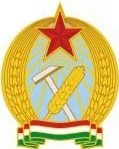
.jpg)
